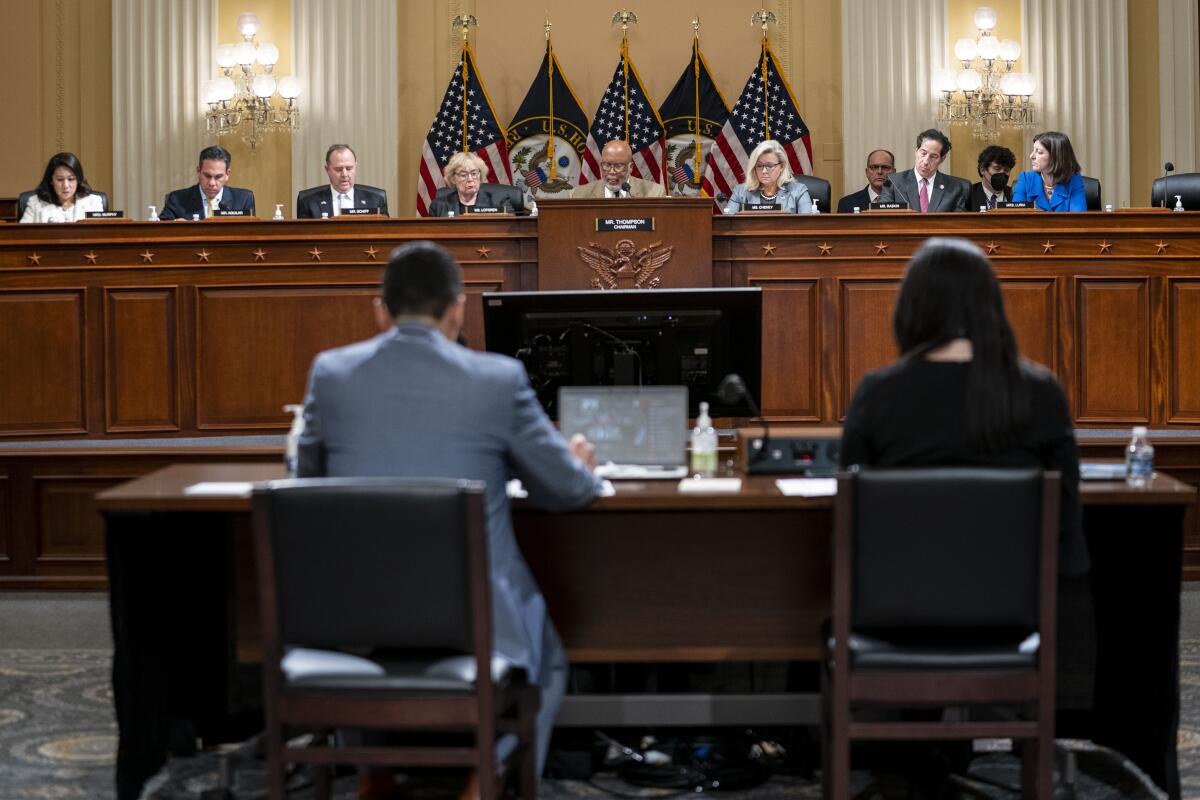Jan. 6 committee seeks contempt charges against two more Trump aides

- Share via
WASHINGTON — The House Jan. 6 Select Committee voted unanimously Monday to recommend holding former President Trump aides Dan Scavino Jr. and Peter Navarro in contempt of Congress for not complying with subpoenas to provide testimony and documents for the committee’s investigation.
The committee is examining Navarro’s and Scavino’s roles in efforts to overturn Donald Trump’s 2020 election loss. Navarro, a former trade advisor, reportedly worked closely with former Trump campaign manager Stephen K. Bannon in the final days to push a scheme that would block certification of election results on Jan. 6. Scavino, a former deputy chief of staff, was one of Trump’s closest confidants.
Among the topics the committee wants to discuss with Scavino is what he knew about threats of violence that day. As Trump’s social media manager, Scavino was visiting sites and online forums where the possibility of violence was being discussed, according to the report the committee will use to hold the two aides in contempt.
“This committee has reason to believe that doing so provided Mr. Scavino with explicit advance warnings of the violence that was to occur on Jan. 6 and Mr. Scavino may have shared these warnings of violence with Mr. Trump before Jan. 6,” Rep. Zoe Lofgren (D-San Jose) said.
The committee also believes Scavino was with Trump on Jan. 5 and Jan. 6, 2021, and could speak to the former president’s actions.
Rep. Pete Aguilar (D-Redlands) said the committee wanted to discuss with Navarro his participation in a Jan. 2 phone call with Trump and state legislators, in which they discussed convincing Vice President Mike Pence to delay certification of the election for 10 days. The idea was that in that time frame, state lawmakers could appoint to the electoral college Trump-supporting electors, despite voters picking Joe Biden.
They also want to talk about Navarro’s attempts to get the former U.S. attorney general to intervene and support Trump’s legal efforts to overturn the election.
The matter must now go to the full House for a vote before it can be referred to the Justice Department for possible criminal charges.
President Biden recently rejected an attempt by both men to assert executive privilege to avoid testifying before the Jan. 6 committee, according to a letter included in the report. The documents also detail a monthslong attempt to get the former aides to testify.
Navarro did not provide evidence that Trump has claimed privilege over any information he might have, according to the report.
Committee Chairman Rep. Bennie Thompson (D-Miss.) said even if Trump had asserted privilege, Navarro and Scavino were obligated to appear before the committee and say so in response to each relevant question.
“But these witnesses didn’t even bother to show up,” Thompson said.
The committee report also states that because it wants to talk to Scavino and Navarro about work they did as private citizens or for the Trump campaign, not as government employees, no privilege would apply.
According to the committee’s report, on Feb. 27, 2022, Navarro told committee staff that “President Trump has invoked [e]xecutive [p]rivilege in this matter; and it is neither my privilege to waive or Joseph Biden’s privilege to waive.”
The House has voted to hold two former Trump officials in contempt for failing to comply with its investigation: former White House Chief of Staff Mark Meadows and Bannon.
The House has not acted on the Jan. 6 committee’s criminal contempt referral against former Department of Justice official Jeffrey Clark, who was closely involved in the effort to overturn the 2020 election.
The Justice Department has pursued criminal charges only for Bannon, a case that is scheduled to go to trial in July. Willful refusal to comply with a congressional subpoena is punishable by a fine of up to $100,000 and imprisonment for up to one year.
More to Read
Get the L.A. Times Politics newsletter
Deeply reported insights into legislation, politics and policy from Sacramento, Washington and beyond. In your inbox twice per week.
You may occasionally receive promotional content from the Los Angeles Times.











